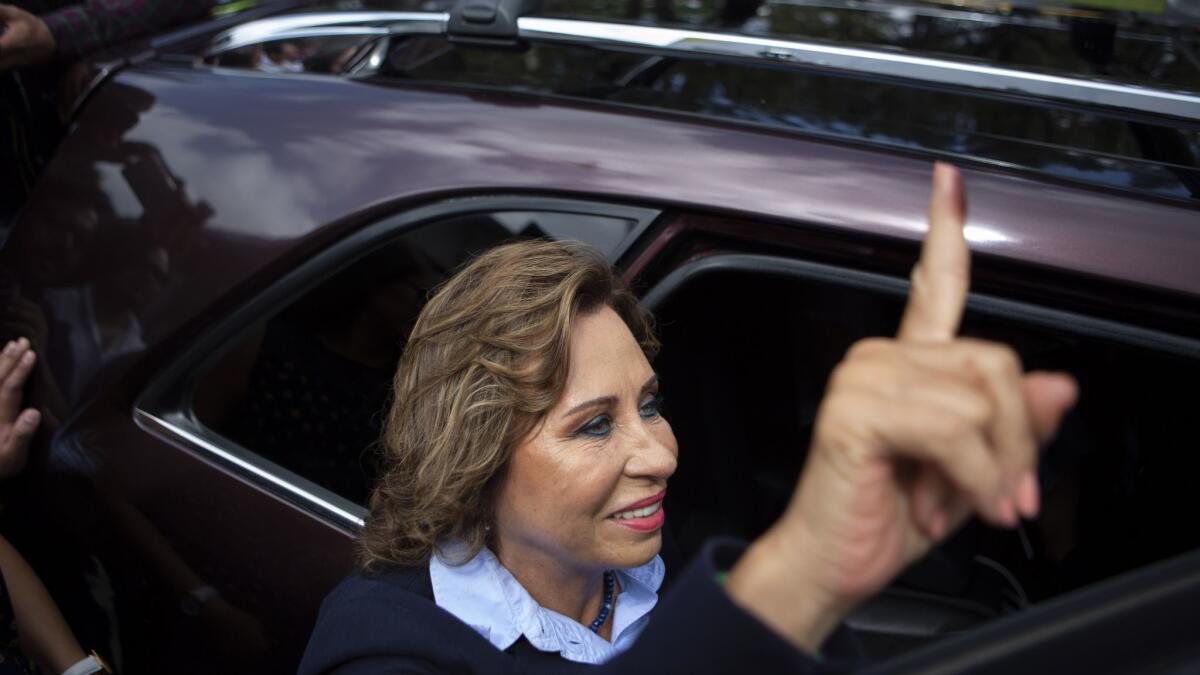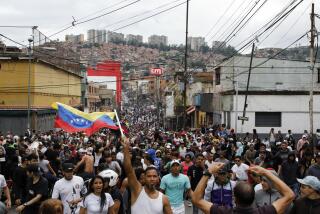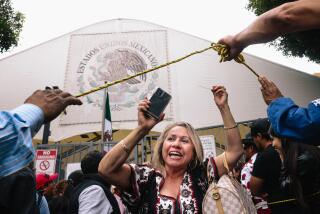Guatemalans vote amid a widespread sense of uncertainty and disillusionment

- Share via
Reporting from Guatemala City — Guatemalans went to the polls Sunday to elect a new president, congressional representatives and other lawmakers amid widespread disenchantment with a corruption-plagued political system long unresponsive to poverty and violence.
Authorities continued counting votes from across the country late Sunday with only partial results trickling in. But preliminary counts strongly indicated that none of the 19 presidential aspirants would win a majority, forcing a runoff election Aug. 11 between the top two finishers.
Running first and second in preliminary returns were two veteran Guatemalan politicians — former First Lady Sandra Torres of the center-left National Unity of Hope party; and Alejandro Giammattei, a doctor and former director of the national penitentiary system, running under the banner of the right-wing Vamos party.
The two had been favorites in preelection polls to win the first two spots in Sunday’s balloting. Both have made multiple previous runs for the presidency — this is Torres’ third attempt and Giammattei’s fourth. Each is 63 years old.
Voters began arriving early Sunday at polling places across this Central American nation. There were scattered reports of election irregularities.
“I feel apathetic about this election,” said Lisbeth Laines, 30, a secretary who cast her ballot here in the capital. “No matter who wins, it feels like we can expect much of the same.”
Preelection debate here has focused on legal challenges to various candidates rather than such key issues as poverty, a major driving force behind the ongoing exodus of Guatemalans and other Central Americans in near-record numbers toward the U.S. border via Mexico.
Many Guatemalans link the lack of economic opportunity with entrenched corruption among the country’s political elites. The large-scale emigration of Guatemalans to the United States has not figured prominently in preelection discussions — despite efforts by the Trump administration to prod Guatemala and other Central American nations to do more to stem the flow.
Guatemala goes to polls amid uncertainty, deep divisions »
Before Sunday’s vote, authorities disqualified five candidates, including Thelma Aldana, a crusading ex-prosecutor whose efforts as an attorney general investigating graft helped send an ex-president and other allegedly crooked lawmakers to jail. She worked in tandem with a United Nations-backed anti-corruption panel that now faces a September deadline to leave Guatemala.
In blocking Aldana from the ballot, electoral authorities cited financial irregularities from her stint as attorney general. But Aldana and her supporters deny any wrongdoing and say she was barred to thwart future anti-corruption inquiries.
Aldana has fled Guatemala since receiving death threats, the Guatemalan media has reported.
Torres, who served as first lady during the presidency of Alvaro Colom until their 2011 divorce, has denied allegations of illicit campaign financing from her unsuccessful 2015 presidential campaign. She finished in second place in the 2015 balloting.
In her campaign, Torres pledged increased social and health initiatives to help battle the poverty that is a major factor driving emigration from Guatemala.
“Immigration is a problem that transcends borders,” Torres said Sunday, as reporters surrounded her at a voting place. “We have to work on the causes of migration, which are violence, poverty, delinquency, lack of political stability.”
Outgoing President Jimmy Morales, whose administration has been plagued by corruption allegations, is not on the ballot. Guatemalan law bans presidential reelection.
While voting Sunday, Morales lamented the ongoing migration of Guatemalans, particularly younger citizens.
“Guatemala also cannot keep on suffering this departure of all this human talent … all this youth that leaves, and homes that disintegrate,” Morales said. “It is necessary to attend to these needs within the country.”
Special correspondent Claudia Palacios in Guatemala City and Cecilia Sanchez of The Times’ Mexico City bureau contributed to this report.
Twitter: @PmcdonnellLAT
More to Read
Sign up for Essential California
The most important California stories and recommendations in your inbox every morning.
You may occasionally receive promotional content from the Los Angeles Times.










